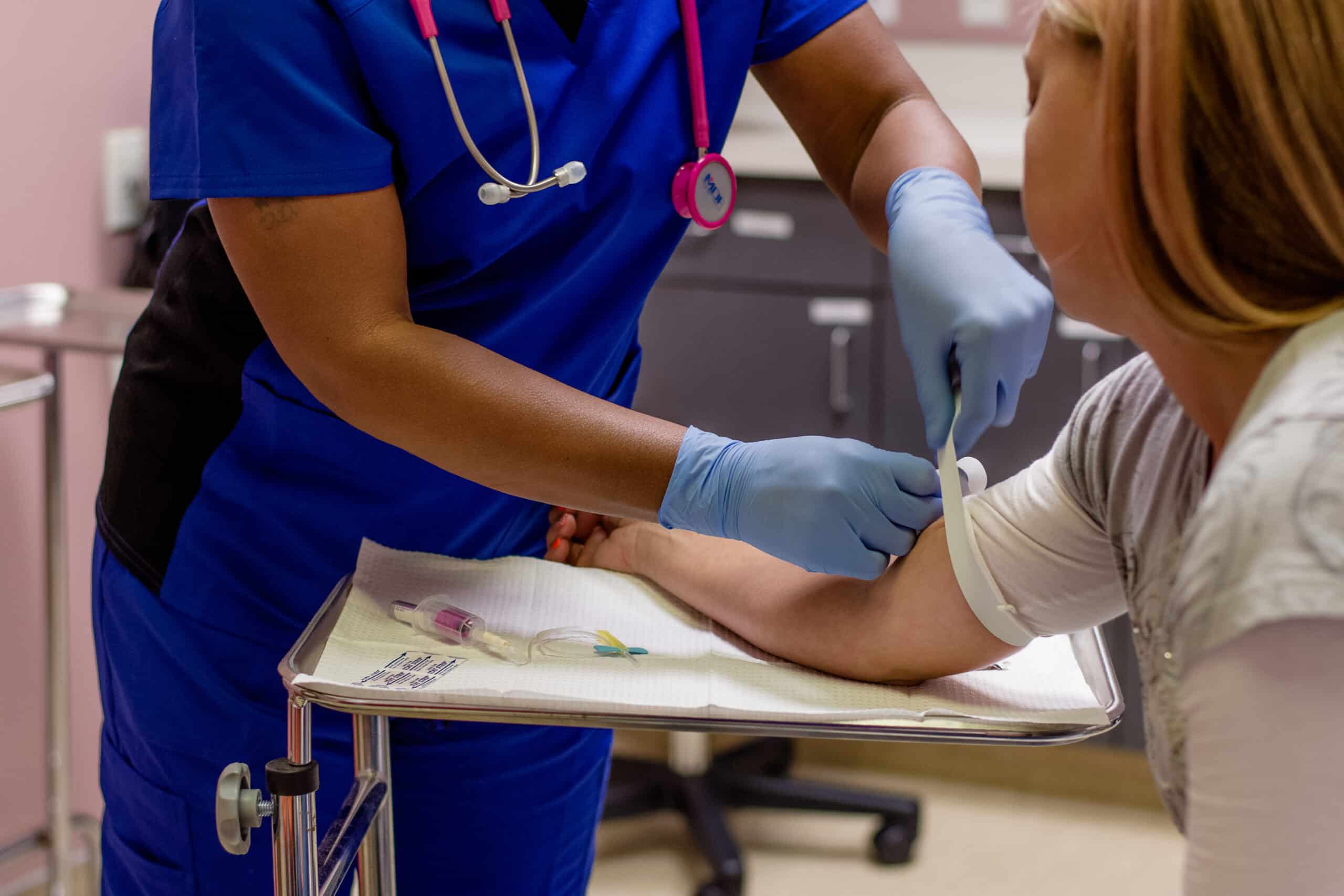What Sets Apart High-Quality Phlebotomy Courses Near Me From the Rest?
What Sets Apart High-Quality Phlebotomy Courses Near Me From the Rest?
Blog Article
The Path to Accreditation: Understanding the Phlebotomy Educating Course Trip and Its Value
As you take into consideration the path to qualification in phlebotomy, it's essential to understand the function you'll play in healthcare. Your training will cover crucial abilities, from blood collection methods to patient communication.

The Role of Phlebotomists in Medical Care
Phlebotomists play a vital role in the health care system, acting as the important web link in between individuals and necessary diagnostic testing. You'll carry out blood draws, making sure samples are gathered properly and safely. Your know-how assists in diagnosing medical problems, keeping an eye on health, and guiding treatment choices.
In your everyday communications, you'll need to establish trust with people, making them really feel comfortable throughout what may be a demanding experience. You're responsible for classifying and taking care of samples thoroughly to avoid contamination or mistakes, which might influence examination results.
Beyond this, you'll often work together with doctors and nurses, interacting essential details regarding people' problems. Your duty is fundamental in preserving the process in health care settings, making sure prompt and exact results. By mastering your abilities, you contribute meaningfully to patient treatment, making you an important component of the medical team. Welcoming this duty is essential to your success as a phlebotomist.
Introduction of Phlebotomy Training Programs
When discovering phlebotomy training programs, you'll discover numerous types designed to fit different routines and finding out styles. Each program aids you establish important skills like blood collection and patient interaction. Recognizing these choices is vital to selecting the appropriate course for your job.
Types of Educating Programs
A number of types of training programs are readily available for those looking to end up being skillful in phlebotomy. In addition, some health centers and clinics use on-the-job training programs, giving useful experience while you learn. Whatever course you pick, each program aims to equip you with the required skills for an effective phlebotomy profession.

Key Abilities Established
Understanding phlebotomy requires a set of key abilities that are created through comprehensive training programs. You'll learn technical abilities like proper vein selection, needle insertion, and blood collection strategies. These hands-on practices guarantee you can execute treatments securely and effectively. In addition, interaction abilities are essential; you'll require to connect with patients, clarify treatments, and put them comfortable. Comprehending anatomy and physiology is critical, also, as it assists you situate capillaries and comprehend the body's response to blood draws. Ultimately, you'll acquire knowledge of security procedures and infection control, guaranteeing you preserve a sterile environment. Each of these abilities is crucial for your success as a licensed phlebotomist, making you a beneficial asset in any medical care setting.
Secret Parts of a Phlebotomy Program
In a phlebotomy program, you'll focus on important topics that prepared for your future career. You'll participate in hands-on training that permits you to use what you have actually found out in real-world setups. Both the curriculum and practical experience are vital for your success as a phlebotomist.
Curriculum Introduction
While seeking a phlebotomy training program, you'll encounter a core educational program developed to furnish you with essential abilities and knowledge. Phlebotomy Classes Near Me. This curriculum typically consists of makeup and physiology, concentrating on the blood circulation system and understanding blood elements. You'll additionally discover different kinds of blood collection approaches, including venipuncture and capillary puncture techniques
In addition, infection control and safety procedures are necessary elements, ensuring you know exactly how to keep a sterile atmosphere. You'll study patient interaction, emphasizing communication and empathy, which are important for easing individual anxiety.
Hands-On Training Experience
Obtaining hands-on experience is a vital component of your phlebotomy training program. This functional training permits you to apply what you've found out in a real-world setup, improving your abilities and self-confidence. Phlebotomy Classes Near Me.
In addition, you'll obtain the opportunity to engage with people, which is vital for developing your interaction skills. This mix of technological effectiveness and social abilities is important for your success as a qualified phlebotomist. Eventually, hands-on training is where theory fulfills method, solidifying your expertise and preparedness for qualification.
Accreditation and Licensing Requirements
Prior to you can begin your career in phlebotomy, it is essential to recognize the accreditation and licensing requirements that differ by state. A lot of states require phlebotomists to hold an accreditation from an acknowledged organization, such as the National Phlebotomy Association or the American Society for Professional Pathology. These certifications usually entail passing a test that evaluates your understanding and skills in the field.
Along with accreditation, some states have details licensing needs. You might need to complete a certain number of hours in medical technique, send evidence of training, or undertake a history check. It is essential to investigate your state's regulations to make certain you satisfy all necessary standards.
Staying notified regarding these needs not just assists you safeguard a placement yet additionally boosts your reliability as an expert. By meeting these needs, you'll be well on your method to a successful profession in phlebotomy.
Hands-On Training and Practical Experience
Hands-on training and practical experience are essential parts of your phlebotomy education, as they permit you to use theoretical expertise in real-world circumstances. During your training, you'll participate in monitored venipuncture, learn proper techniques, and come to be check these guys out familiar with different blood collection devices. This direct participation is critical for constructing your self-confidence and honing your abilities.
You'll function closely with knowledgeable professionals who can lead you via the subtleties of person communication and sample handling. Each practice session not only reinforces your understanding yet additionally prepares you for the fast-paced atmosphere of health care setups.
Additionally, lots of programs incorporate medical turnings, allowing you to experience diverse settings, from healthcare facilities to outpatient clinics. This direct exposure helps you adjust to various obstacles and client demands, guaranteeing you're well-prepared for your future function. Accept these chances, as they're vital to ending up being a competent and thoughtful phlebotomist.
Challenges Faced During Training
While gaining hands-on experience is crucial, it's vital to identify the obstacles that can occur throughout your phlebotomy training. In addition, mastering the skills required for blood attracts takes technique; you might struggle with technique originally.
Time monitoring can also be a difficulty, as balancing concept, functional sessions, and personal dedications can really feel intimidating. You might deal with varying learning speeds among your peers, resulting in feelings of self-doubt if you think you're falling back. Adjusting to the various personalities of teachers can be challenging, as each may have use this link an unique teaching style.
Recognizing these challenges early can prepare you for success and assist you develop strength throughout your training trip.
Career Opportunities After Certification

As you obtain experience, you could also think about specializing in locations like pediatric or senior citizen phlebotomy, dealing with details person demands. Some phlebotomists select to advance their jobs by ending up being research laboratory specialists or pursuing additional education and learning in medical care areas.
Furthermore, your accreditation can lead to roles in training or managing brand-new phlebotomists, allowing you to share your understanding. With the healthcare market continually growing, your abilities will certainly always be in need, leading the means for a steady and meeting profession. Accept the possibilities waiting for you!
Often Asked Inquiries
What Is the Common Period of a Phlebotomy Training Program?
Phlebotomy training courses generally last around four to eight weeks. You'll take part in hands-on technique, classroom instruction, and on the internet learning. Finishing this training prepares you for certification and a satisfying profession in healthcare.
Are Online Phlebotomy Courses Available?
Yes, online phlebotomy programs are readily available. They use versatility and benefit, permitting you to research at your very own rate. Just verify the program is approved to satisfy qualification needs and acquire important see skills for your profession.
How Much Does Phlebotomy Training Generally Price?
Phlebotomy training typically costs in between $700 and $2,500, relying on the program and place. You ought to take into consideration elements like course size, included materials, and hands-on experience when choosing the best training for you.
What Prevail Requirements for Phlebotomy Training?
Common prerequisites for phlebotomy training commonly consist of a high school diploma or GED, booster shots, and a history check. Some programs may additionally call for standard medical care understanding or certifications, ensuring you're planned for hands-on training.
Can I Function While Completing My Phlebotomy Training?
Yes, you can work while completing your phlebotomy training. Many pupils balance work with their research studies, yet make sure to handle your time effectively to guarantee you satisfy both work and training commitments effectively.
Report this page